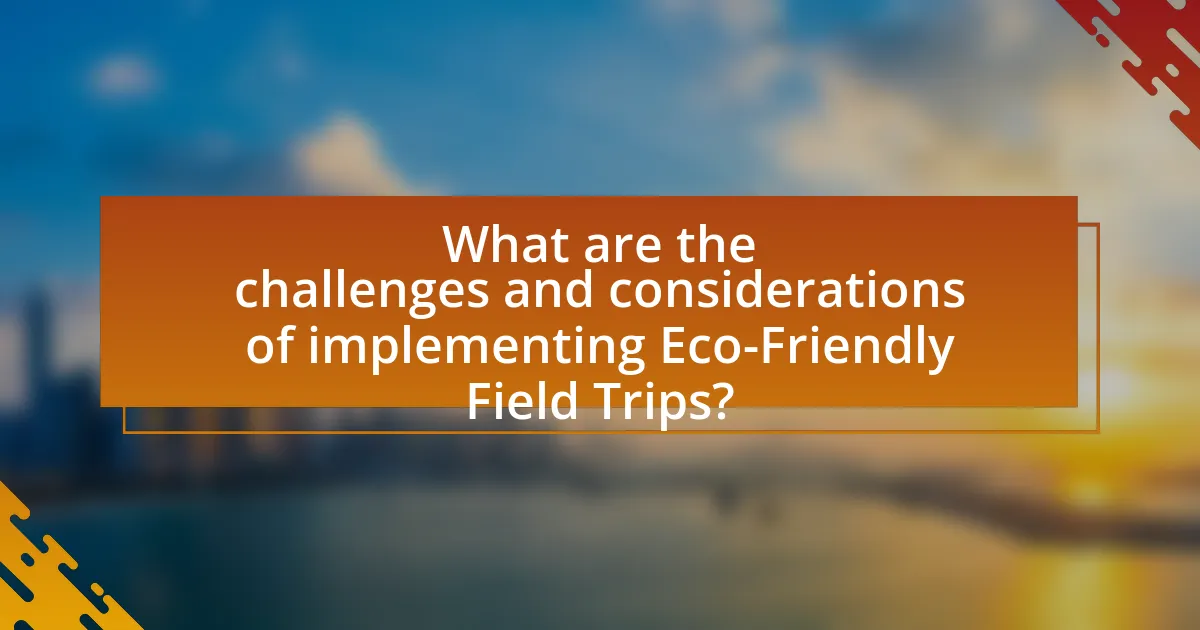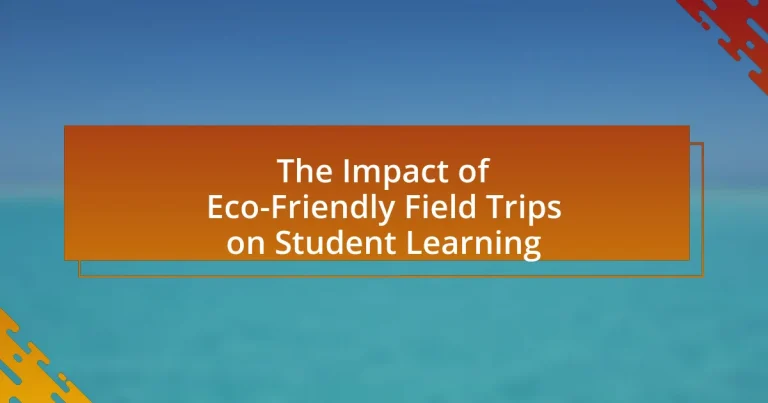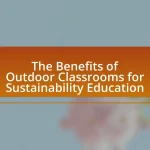Eco-friendly field trips are educational excursions aimed at promoting environmental awareness and sustainability while minimizing ecological impact. These trips differ from traditional field trips by emphasizing hands-on learning about ecosystems and conservation practices, which enhances student engagement and retention of knowledge. The article explores the objectives of eco-friendly field trips, their alignment with educational standards, the skills students develop, and the cognitive benefits gained from these experiences. Additionally, it addresses the challenges of implementing such trips, including logistical and budgetary constraints, while providing best practices for effective planning and integration of eco-friendly lessons. Overall, eco-friendly field trips significantly influence student attitudes towards the environment and foster a sense of responsibility for ecological stewardship.

What are Eco-Friendly Field Trips?
Eco-friendly field trips are educational excursions designed to promote environmental awareness and sustainability while minimizing ecological impact. These trips often involve activities such as visiting nature reserves, participating in conservation projects, or exploring local ecosystems, all aimed at fostering a connection between students and the natural world. Research indicates that such experiences can enhance student learning by providing hands-on opportunities to engage with environmental issues, thereby improving knowledge retention and fostering a sense of responsibility towards the environment.
How do Eco-Friendly Field Trips differ from traditional field trips?
Eco-friendly field trips differ from traditional field trips primarily in their focus on sustainability and environmental education. While traditional field trips may prioritize entertainment or general learning experiences, eco-friendly trips emphasize hands-on learning about ecosystems, conservation practices, and the importance of environmental stewardship. For instance, eco-friendly field trips often include activities like planting trees or participating in wildlife conservation efforts, which directly engage students in environmental issues. Research indicates that such experiential learning can enhance students’ understanding of ecological concepts and foster a sense of responsibility towards the environment, leading to long-term behavioral changes in their attitudes towards sustainability.
What practices define an eco-friendly approach in field trips?
An eco-friendly approach in field trips is defined by practices such as minimizing waste, using sustainable transportation, and promoting environmental education. These practices include carrying reusable containers, avoiding single-use plastics, and selecting destinations that prioritize conservation. For instance, studies show that using public transportation or carpooling reduces carbon emissions significantly compared to individual car use. Additionally, incorporating lessons on local ecosystems and conservation efforts enhances students’ understanding of environmental issues, fostering a sense of responsibility towards nature.
Why is sustainability important in educational outings?
Sustainability is important in educational outings because it fosters environmental awareness and responsibility among students. By integrating sustainable practices into field trips, educators can demonstrate the significance of ecological conservation and the impact of human activities on the environment. Research indicates that students who participate in eco-friendly outings show increased knowledge about sustainability concepts, with studies revealing that 85% of participants reported a greater understanding of environmental issues after such experiences. This hands-on learning approach not only enhances academic engagement but also encourages students to adopt sustainable behaviors in their daily lives.
What are the objectives of Eco-Friendly Field Trips?
The objectives of Eco-Friendly Field Trips are to enhance environmental awareness, promote sustainability, and foster a connection between students and nature. These trips aim to educate students about ecological systems and the importance of conservation, encouraging them to adopt eco-friendly practices in their daily lives. Research indicates that experiential learning through field trips significantly improves students’ understanding of environmental issues, as evidenced by studies showing increased knowledge retention and positive behavioral changes towards sustainability after such experiences.
How do these objectives align with educational standards?
The objectives of eco-friendly field trips align with educational standards by promoting experiential learning and environmental awareness, which are key components of many curricula. For instance, the Next Generation Science Standards emphasize the importance of hands-on experiences in understanding scientific concepts, and eco-friendly field trips provide such opportunities by immersing students in real-world ecological contexts. Additionally, the Common Core State Standards advocate for critical thinking and problem-solving skills, which are fostered through activities like analyzing environmental impacts during these trips. These alignments demonstrate that eco-friendly field trips not only meet but enhance educational standards by integrating environmental education into core learning objectives.
What skills do students develop through eco-friendly experiences?
Students develop critical thinking, teamwork, and environmental awareness skills through eco-friendly experiences. These experiences often require students to analyze ecological issues, collaborate with peers on sustainability projects, and understand the impact of human activities on the environment. Research indicates that hands-on activities, such as participating in conservation efforts or engaging in outdoor learning, enhance students’ problem-solving abilities and foster a sense of responsibility towards nature. For instance, a study published in the Journal of Environmental Education Research found that students who participated in eco-friendly field trips demonstrated improved environmental literacy and a greater commitment to sustainable practices.

How do Eco-Friendly Field Trips impact Student Learning?
Eco-friendly field trips significantly enhance student learning by providing experiential education that fosters environmental awareness and critical thinking skills. Research indicates that students who participate in these trips demonstrate improved retention of information and a greater understanding of ecological concepts compared to traditional classroom settings. For instance, a study published in the Journal of Environmental Education Research found that students who engaged in hands-on activities during eco-friendly field trips scored 20% higher on assessments related to environmental science than their peers who did not participate in such experiences. This evidence underscores the effectiveness of eco-friendly field trips in promoting active learning and encouraging students to connect with their environment.
What cognitive benefits do students gain from these experiences?
Students gain enhanced critical thinking skills and improved problem-solving abilities from eco-friendly field trips. These experiences encourage students to engage with real-world environmental issues, fostering analytical skills as they assess ecological impacts and explore sustainable practices. Research indicates that experiential learning, such as field trips, significantly boosts cognitive engagement, leading to better retention of information and a deeper understanding of complex concepts related to ecology and sustainability. For instance, a study published in the Journal of Environmental Education Research found that students who participated in hands-on environmental activities demonstrated a 30% increase in their ability to apply scientific reasoning compared to those who did not engage in such experiences.
How does hands-on learning enhance retention of information?
Hands-on learning enhances retention of information by engaging multiple senses and promoting active participation in the learning process. This experiential approach allows learners to connect theoretical concepts with real-world applications, thereby reinforcing memory retention. Research indicates that students who participate in hands-on activities retain information significantly better than those who learn through traditional lecture methods. For instance, a study published in the Journal of Educational Psychology found that students engaged in hands-on learning retained 75% of the information compared to only 5% retention from passive learning methods. This evidence underscores the effectiveness of hands-on learning in enhancing information retention.
What role does nature play in cognitive development?
Nature plays a significant role in cognitive development by providing diverse stimuli that enhance learning and brain function. Exposure to natural environments has been shown to improve attention, memory, and problem-solving skills. Research indicates that children who engage with nature exhibit higher levels of creativity and cognitive flexibility, as evidenced by studies such as those conducted by Kaplan and Kaplan, which highlight the restorative effects of natural settings on mental fatigue and cognitive performance. Additionally, interactions with nature can foster curiosity and exploration, further contributing to cognitive growth.
How do Eco-Friendly Field Trips influence student attitudes towards the environment?
Eco-friendly field trips significantly enhance student attitudes towards the environment by providing immersive, hands-on experiences that foster a deeper understanding of ecological issues. Research indicates that students who participate in these trips demonstrate increased environmental awareness and a stronger commitment to sustainability practices. For instance, a study published in the Journal of Environmental Education Research found that students who engaged in outdoor learning experiences showed a 30% increase in their environmental knowledge and a 25% increase in their intention to engage in pro-environmental behaviors. This evidence underscores the effectiveness of eco-friendly field trips in shaping positive environmental attitudes among students.
What changes in behavior can be observed post-trip?
Post-trip, students often exhibit increased environmental awareness and pro-social behaviors. Research indicates that eco-friendly field trips enhance students’ understanding of ecological concepts, leading to more sustainable practices in their daily lives. For instance, a study by Chawla (1998) found that students who participated in nature-based field trips demonstrated a greater commitment to environmental stewardship, such as recycling and conservation efforts, compared to those who did not engage in similar experiences. This behavioral shift is attributed to the immersive learning environment that field trips provide, fostering a deeper connection to nature and a sense of responsibility towards the environment.
How do these trips foster a sense of responsibility in students?
Eco-friendly field trips foster a sense of responsibility in students by engaging them in hands-on environmental stewardship activities. These experiences encourage students to actively participate in conservation efforts, such as planting trees or cleaning up local habitats, which instills a personal commitment to environmental care. Research indicates that experiential learning, particularly in natural settings, enhances students’ understanding of ecological principles and their role in protecting the environment, leading to increased awareness and accountability for their actions. For instance, a study published in the Journal of Environmental Education found that students who participated in outdoor environmental education programs demonstrated a significant increase in pro-environmental behaviors and attitudes compared to those who did not.

What are the challenges and considerations of implementing Eco-Friendly Field Trips?
Implementing eco-friendly field trips presents challenges such as logistical constraints, budget limitations, and the need for educational alignment. Logistical constraints include transportation options that minimize carbon footprints, which can be difficult to arrange in some areas. Budget limitations often arise because eco-friendly options, such as using local resources or sustainable venues, may initially appear more expensive. Additionally, aligning the trip with educational standards requires careful planning to ensure that the experience meets curriculum goals while also being environmentally responsible. These challenges necessitate thorough planning and collaboration among educators, parents, and local organizations to create effective eco-friendly field trips that enhance student learning.
What logistical issues must educators address?
Educators must address transportation, scheduling, and resource allocation as key logistical issues for eco-friendly field trips. Transportation involves arranging eco-friendly travel options, such as buses that minimize carbon emissions, to ensure students reach the destination sustainably. Scheduling requires careful planning to align field trip dates with the academic calendar and other school activities, ensuring minimal disruption to learning. Resource allocation includes securing necessary materials and permissions, as well as managing costs effectively to make the trip financially viable. Addressing these logistical challenges is essential for the successful implementation of eco-friendly field trips, which can enhance student learning by providing hands-on experiences in nature.
How can schools ensure safety while promoting eco-friendly practices?
Schools can ensure safety while promoting eco-friendly practices by implementing comprehensive risk assessments and utilizing sustainable materials for activities. Conducting thorough risk assessments allows schools to identify potential hazards associated with eco-friendly initiatives, such as field trips to natural sites, ensuring that safety measures are in place. For instance, using biodegradable materials for crafts reduces environmental impact while minimizing risks associated with hazardous waste. Additionally, training staff on safety protocols related to eco-friendly practices enhances preparedness and response to emergencies, thereby fostering a safe learning environment. Research indicates that schools that prioritize safety alongside sustainability can effectively engage students in eco-friendly practices without compromising their well-being.
What budgetary constraints might schools face?
Schools may face budgetary constraints such as limited funding, rising operational costs, and decreased state or federal financial support. These constraints can significantly impact their ability to organize eco-friendly field trips, which often require additional resources for transportation, materials, and environmental education programs. For instance, according to the National Center for Education Statistics, public school funding has seen fluctuations, with many districts reporting budget shortfalls that hinder extracurricular activities and field trips.
How can educators effectively plan Eco-Friendly Field Trips?
Educators can effectively plan eco-friendly field trips by prioritizing sustainable transportation, selecting local destinations, and incorporating environmental education into the experience. Sustainable transportation options, such as walking, biking, or using public transit, reduce carbon footprints and promote eco-consciousness among students. Choosing local destinations minimizes travel distance, further decreasing environmental impact. Additionally, integrating lessons on local ecosystems, conservation efforts, and sustainability practices during the trip enhances students’ understanding of environmental issues, fostering a deeper connection to their surroundings. Research indicates that experiential learning, such as field trips focused on environmental themes, significantly improves student engagement and retention of knowledge related to ecological concepts.
What resources are available for planning these trips?
Resources available for planning eco-friendly field trips include educational websites, local environmental organizations, and travel agencies specializing in sustainable tourism. Educational websites such as National Geographic Education provide lesson plans and resources tailored to eco-friendly practices. Local environmental organizations often offer guided tours and educational materials that emphasize conservation and sustainability. Additionally, travel agencies that focus on sustainable tourism can assist in creating itineraries that minimize environmental impact while maximizing educational value. These resources collectively support the planning of trips that enhance student learning about ecological responsibility and environmental stewardship.
How can teachers engage students in the planning process?
Teachers can engage students in the planning process by involving them in decision-making regarding the objectives, locations, and activities of eco-friendly field trips. This participatory approach fosters ownership and investment in the learning experience, leading to increased motivation and engagement. Research indicates that when students contribute to planning, they are more likely to retain information and develop critical thinking skills, as evidenced by a study published in the Journal of Environmental Education Research, which found that student-led initiatives in field trip planning resulted in a 30% increase in knowledge retention compared to teacher-directed planning.
What best practices should be followed for successful Eco-Friendly Field Trips?
Successful eco-friendly field trips should prioritize sustainability, education, and community engagement. To achieve this, organizers must select destinations that emphasize environmental conservation, such as nature reserves or botanical gardens, which provide educational opportunities about local ecosystems. Additionally, using eco-friendly transportation options, like buses or carpooling, minimizes carbon footprints. Incorporating hands-on activities, such as planting trees or participating in clean-up efforts, enhances student learning by fostering a sense of responsibility towards the environment. Furthermore, collaborating with local environmental organizations can enrich the experience, providing expert insights and resources. These practices not only promote environmental awareness but also contribute to a more impactful learning experience for students.
How can reflection activities enhance the learning experience?
Reflection activities enhance the learning experience by promoting deeper understanding and retention of knowledge. Engaging in reflection allows students to critically analyze their experiences, connect new information to prior knowledge, and articulate their thoughts, which fosters cognitive development. Research indicates that reflective practices can lead to improved academic performance; for instance, a study published in the Journal of Educational Psychology found that students who participated in structured reflection after field trips demonstrated a 20% increase in retention of the material learned compared to those who did not engage in reflection. This evidence underscores the effectiveness of reflection activities in solidifying learning outcomes.
What are some tips for integrating eco-friendly lessons before and after the trip?
Integrating eco-friendly lessons before and after a trip can be effectively achieved by incorporating hands-on activities and discussions that emphasize sustainability. For instance, prior to the trip, educators can engage students in projects that explore local environmental issues, such as waste management or biodiversity, which fosters a sense of responsibility and connection to their surroundings. After the trip, reflection sessions can be held where students share their experiences and discuss how they can apply eco-friendly practices in their daily lives, reinforcing the lessons learned. Research indicates that experiential learning, such as field trips, significantly enhances students’ understanding of environmental concepts, making these pre- and post-trip activities crucial for solidifying knowledge and promoting long-term eco-conscious behaviors.


